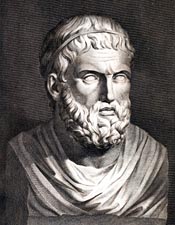Electra
, translated by Theodoridis, G., (contributor-contact-email)
Sophocles’ tragedy Electra is believed to have been written in the latter part of his career. The play shares stylistic similarities with Philoctetes (409 BC) and Oedipus at Colonus (401 BC) suggesting contemporaneous composition. The drama unfolds in Argos, shortly after the Trojan War, focusing on Electra and her brother Orestes’ quest for retribution against their mother Clytemnestra and stepfather Aegisthus for the murder of their father, King Agamemnon.
Agamemnon’s return from the Trojan War ends in his assassination by Clytemnestra and her lover Aegisthus. Clytemnestra justifies this act, citing Agamemnon’s sacrifice of their daughter Iphigenia. Electra had saved her brother Orestes from Clytemnestra’s influence by sending him away to Phocis. The play commences with Orestes’ return as an adult, intent on avenging his father’s death and reclaiming the throne. Electra is notable amongst the Greek tragedies for its focus on plot-driven action.

Theodoridis, G.,
Support Open-Access:
Your contribution keeps our classical translations available to all. Every dollar helps support classics education and funds the expansion of our catalogue. Value what we do? Donate now.
File Downloads:
© Copyright, All Rights Reserved. This work may be freely reproduced, stored and transmitted, electronically or otherwise, for any non-commercial purpose. Conditions and Exceptions apply.